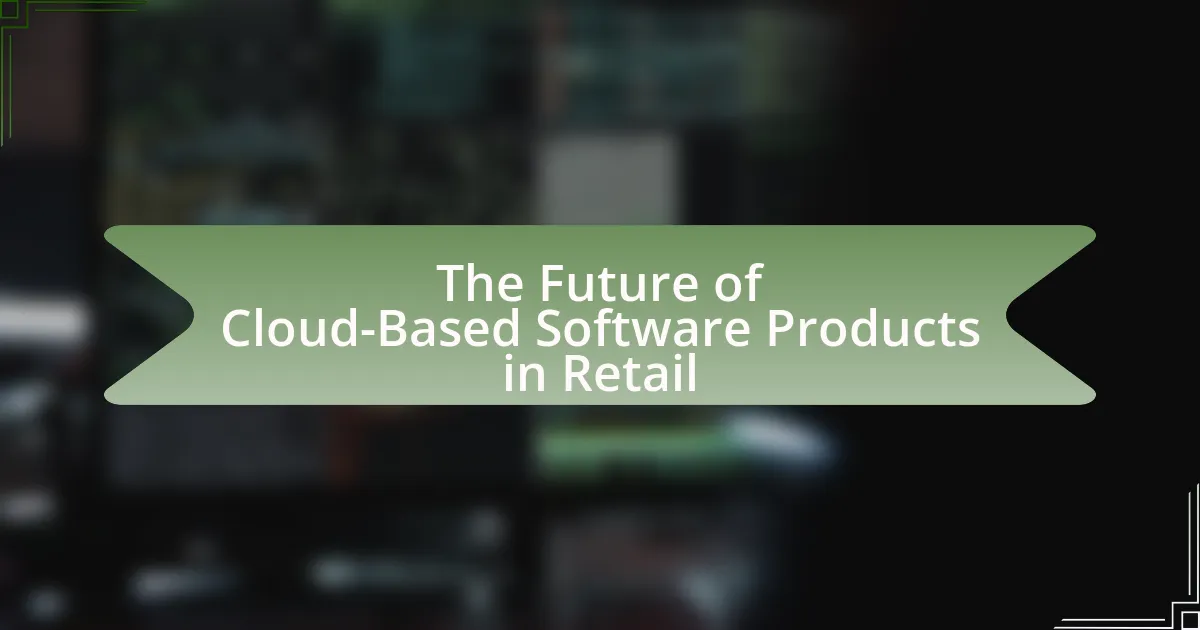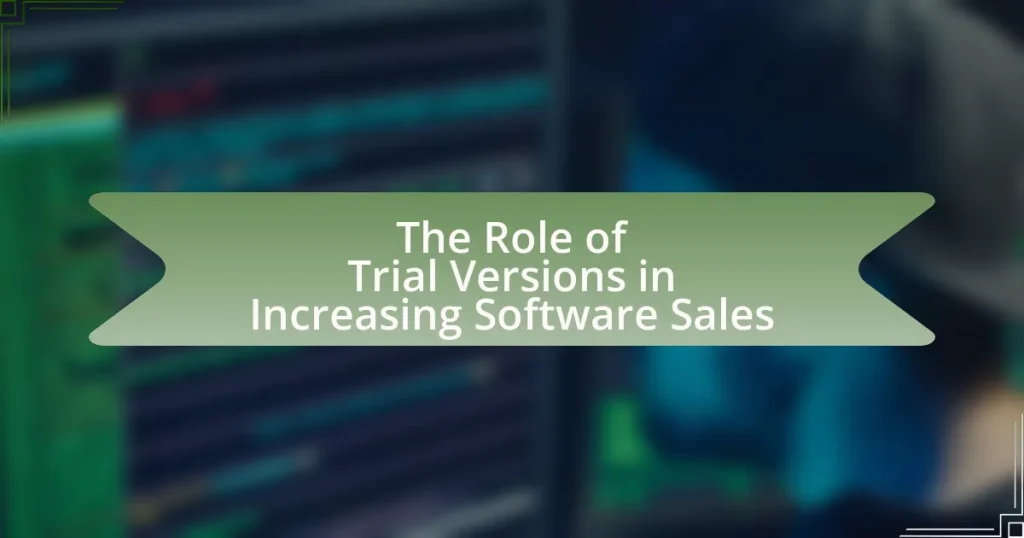Cloud-based software products in retail are applications hosted on remote servers, allowing retailers to manage operations such as inventory, sales, and customer relationships via the internet. This article explores the differences between cloud-based and traditional software, highlighting key features like scalability, accessibility, and cost-effectiveness. It discusses the essential role of cloud solutions in enhancing operational efficiency, addressing challenges faced by retailers, and improving customer experience. Additionally, the article examines the influence of artificial intelligence and data analytics on cloud-based retail software, as well as potential challenges and best practices for successful implementation and continuous improvement in retail operations.
What are Cloud-Based Software Products in Retail?
Cloud-based software products in retail are applications hosted on remote servers that retailers access via the internet. These products enable retailers to manage various operations such as inventory, sales, customer relationship management, and analytics without the need for extensive on-premises infrastructure. According to a report by Gartner, the global cloud services market is projected to reach $623.3 billion by 2023, highlighting the increasing reliance on cloud solutions in various sectors, including retail.
How do cloud-based software products differ from traditional software?
Cloud-based software products differ from traditional software primarily in their delivery model and accessibility. Cloud-based software is hosted on remote servers and accessed via the internet, allowing users to access applications from any device with internet connectivity, whereas traditional software is installed locally on individual computers and typically requires specific hardware and operating systems.
This difference in accessibility enables cloud-based software to offer features like automatic updates, scalability, and collaborative tools that are often not available in traditional software. For instance, according to a report by Gartner, organizations that adopt cloud-based solutions can reduce IT costs by up to 30% due to lower maintenance and infrastructure expenses. Additionally, cloud-based software often employs a subscription model, providing flexibility in payment and usage, contrasting with the one-time purchase model of traditional software.
What are the key features of cloud-based software products?
Cloud-based software products are characterized by features such as scalability, accessibility, cost-effectiveness, and automatic updates. Scalability allows businesses to adjust resources based on demand, enabling efficient management of varying workloads. Accessibility ensures that users can access the software from any location with internet connectivity, facilitating remote work and collaboration. Cost-effectiveness is achieved through reduced infrastructure costs and pay-as-you-go pricing models, which are particularly beneficial for retail businesses. Automatic updates keep the software current without requiring manual intervention, ensuring that users always have access to the latest features and security enhancements. These features collectively enhance operational efficiency and flexibility for retail businesses leveraging cloud-based solutions.
How does scalability play a role in cloud-based solutions?
Scalability is crucial in cloud-based solutions as it allows businesses to adjust their resources according to demand. This flexibility enables companies to efficiently manage varying workloads, ensuring optimal performance during peak times without incurring unnecessary costs during low-demand periods. For instance, a retail business can scale its cloud resources up during holiday seasons to handle increased traffic and scale down afterward, thus optimizing operational efficiency and cost-effectiveness. According to a report by Gartner, organizations that leverage scalable cloud solutions can reduce IT costs by up to 30%, demonstrating the financial benefits of scalability in cloud environments.
Why are cloud-based software products becoming essential in retail?
Cloud-based software products are becoming essential in retail due to their ability to enhance operational efficiency and scalability. Retailers increasingly rely on these solutions to manage inventory, streamline supply chains, and improve customer engagement. For instance, a report by Gartner indicates that 70% of organizations will have shifted to cloud-based services by 2025, highlighting the trend towards digital transformation in retail. Additionally, cloud solutions offer real-time data access, enabling retailers to make informed decisions quickly, which is crucial in a fast-paced market.
What challenges do retailers face that cloud solutions can address?
Retailers face challenges such as inventory management, data security, and scalability that cloud solutions can effectively address. Cloud solutions enable real-time inventory tracking, allowing retailers to optimize stock levels and reduce excess inventory, which is crucial for maintaining profitability. Additionally, cloud platforms offer enhanced data security measures, protecting sensitive customer information and transaction data from breaches, which is increasingly important as cyber threats grow. Furthermore, cloud solutions provide scalability, allowing retailers to easily adjust resources based on demand fluctuations, thus supporting growth without significant upfront investment in infrastructure. These capabilities are essential for retailers aiming to remain competitive in a rapidly evolving market.
How do cloud-based products enhance customer experience?
Cloud-based products enhance customer experience by providing seamless access to services and personalized interactions. These products enable retailers to gather and analyze customer data in real-time, allowing for tailored recommendations and improved service delivery. For instance, a study by McKinsey & Company found that companies leveraging cloud technology can increase customer satisfaction by up to 20% through enhanced responsiveness and customization. Additionally, cloud-based solutions facilitate efficient communication and support, ensuring customers receive timely assistance, which further elevates their overall experience.
What trends are shaping the future of Cloud-Based Software Products in Retail?
The future of cloud-based software products in retail is being shaped by trends such as increased adoption of artificial intelligence, enhanced data analytics capabilities, and the rise of omnichannel retailing. Artificial intelligence is enabling retailers to personalize customer experiences and optimize inventory management, with 80% of retailers planning to invest in AI technologies by 2025. Enhanced data analytics allows retailers to gain insights into consumer behavior, leading to more informed decision-making; a report by McKinsey indicates that data-driven organizations are 23 times more likely to acquire customers. Additionally, the rise of omnichannel retailing necessitates seamless integration of cloud solutions to provide a consistent shopping experience across various platforms, with 73% of consumers using multiple channels during their shopping journey. These trends collectively indicate a significant shift towards more agile, data-driven, and customer-centric retail operations.
How is artificial intelligence influencing cloud-based retail software?
Artificial intelligence is significantly influencing cloud-based retail software by enhancing data analytics, personalizing customer experiences, and optimizing inventory management. AI algorithms analyze vast amounts of data in real-time, enabling retailers to gain insights into consumer behavior and preferences, which leads to more targeted marketing strategies. For instance, a study by McKinsey & Company found that retailers using AI-driven analytics can increase their operating margins by up to 60%. Additionally, AI-powered chatbots and recommendation systems improve customer engagement and satisfaction, driving sales growth. Furthermore, AI helps in predicting demand and managing stock levels efficiently, reducing costs associated with overstocking or stockouts.
What are the applications of AI in cloud-based retail solutions?
AI applications in cloud-based retail solutions include personalized customer experiences, inventory management, demand forecasting, and fraud detection. Personalized customer experiences leverage AI algorithms to analyze consumer behavior and preferences, enabling retailers to offer tailored recommendations and promotions. Inventory management utilizes AI to optimize stock levels and reduce waste by predicting demand patterns based on historical data and market trends. Demand forecasting employs machine learning models to analyze various factors, such as seasonality and economic indicators, to improve accuracy in predicting future sales. Fraud detection systems use AI to identify unusual transaction patterns, enhancing security and reducing losses. These applications demonstrate how AI enhances efficiency and customer satisfaction in cloud-based retail environments.
How does AI improve inventory management in retail?
AI improves inventory management in retail by enhancing demand forecasting, optimizing stock levels, and automating replenishment processes. Retailers utilizing AI algorithms can analyze historical sales data, seasonal trends, and external factors to predict future demand with greater accuracy, reducing instances of overstock and stockouts. For example, a study by McKinsey found that retailers using AI for inventory management can reduce inventory costs by 10-30% while improving service levels. Additionally, AI systems can automate the ordering process, ensuring that stock is replenished efficiently based on real-time data, which further streamlines operations and minimizes human error.
What role does data analytics play in cloud-based retail software?
Data analytics plays a crucial role in cloud-based retail software by enabling retailers to gain insights from vast amounts of data collected from various sources. This capability allows businesses to understand customer behavior, optimize inventory management, and enhance personalized marketing strategies. For instance, a study by McKinsey & Company found that retailers leveraging data analytics can improve their operating margins by 60% through better decision-making and targeted promotions. Thus, data analytics not only enhances operational efficiency but also drives revenue growth in cloud-based retail environments.
How can retailers leverage data analytics for better decision-making?
Retailers can leverage data analytics for better decision-making by utilizing insights derived from customer behavior, inventory management, and sales trends. By analyzing customer data, retailers can identify purchasing patterns and preferences, allowing for personalized marketing strategies that enhance customer engagement and increase sales. Furthermore, data analytics enables retailers to optimize inventory levels by predicting demand, reducing excess stock and minimizing stockouts. According to a study by McKinsey, companies that effectively use data analytics can increase their operating margins by 60%. This demonstrates that data-driven decision-making not only improves operational efficiency but also significantly impacts profitability.
What are the benefits of real-time data access for retailers?
Real-time data access provides retailers with enhanced decision-making capabilities, allowing them to respond swiftly to market changes and customer demands. This immediacy enables retailers to optimize inventory management, ensuring that stock levels align with current sales trends, which can reduce excess inventory costs by up to 30%. Additionally, real-time insights into customer behavior facilitate personalized marketing strategies, increasing customer engagement and potentially boosting sales by 20% according to industry studies. Furthermore, real-time data access supports improved supply chain efficiency, as retailers can track shipments and manage logistics dynamically, leading to reduced delivery times and improved customer satisfaction.
What are the potential challenges of adopting Cloud-Based Software Products in Retail?
The potential challenges of adopting cloud-based software products in retail include data security concerns, integration issues with existing systems, and potential downtime. Retailers often face risks related to data breaches, as sensitive customer information is stored in the cloud, making it vulnerable to cyberattacks. According to a 2021 report by IBM, 43% of data breaches involve small and medium-sized businesses, highlighting the importance of robust security measures. Additionally, integrating cloud solutions with legacy systems can be complex and costly, leading to operational disruptions. A study by McKinsey indicates that 70% of digital transformations fail due to integration challenges. Lastly, reliance on internet connectivity means that any downtime can severely impact retail operations, resulting in lost sales and customer dissatisfaction.
What security concerns should retailers consider with cloud solutions?
Retailers should consider data breaches, compliance issues, and vendor security when utilizing cloud solutions. Data breaches can expose sensitive customer information, leading to financial loss and reputational damage; for instance, the 2017 Equifax breach affected 147 million consumers. Compliance issues arise from regulations like GDPR and PCI DSS, which mandate strict data handling practices; failure to comply can result in hefty fines. Additionally, the security of third-party vendors is crucial, as vulnerabilities in their systems can compromise retailer data; a 2020 report indicated that 63% of data breaches involved third-party vendors.
How can retailers mitigate risks associated with data breaches?
Retailers can mitigate risks associated with data breaches by implementing robust cybersecurity measures, including encryption, regular security audits, and employee training. Encryption protects sensitive customer data, making it unreadable to unauthorized users, while regular security audits help identify vulnerabilities in systems. Employee training ensures that staff are aware of security protocols and phishing threats, reducing the likelihood of human error leading to breaches. According to the 2021 Verizon Data Breach Investigations Report, 85% of breaches involved a human element, highlighting the importance of comprehensive training.
What compliance issues must retailers be aware of?
Retailers must be aware of compliance issues related to data protection, consumer rights, and financial regulations. Data protection laws, such as the General Data Protection Regulation (GDPR) in Europe, require retailers to safeguard customer information and ensure transparency in data usage. Consumer rights regulations mandate accurate product descriptions, fair pricing, and return policies, while financial regulations, including the Payment Card Industry Data Security Standard (PCI DSS), enforce secure handling of payment information. Non-compliance can lead to significant fines and damage to reputation, emphasizing the importance of adhering to these legal frameworks.
How can retailers ensure a smooth transition to cloud-based software?
Retailers can ensure a smooth transition to cloud-based software by implementing a structured migration plan that includes thorough training, data backup, and phased rollouts. A structured migration plan allows retailers to identify potential challenges and address them proactively, minimizing disruptions. Training staff on the new system is crucial, as it enhances user adoption and reduces resistance to change. Additionally, backing up existing data before migration safeguards against data loss, while phased rollouts enable retailers to test the new system in stages, allowing for adjustments based on feedback. Research indicates that organizations that follow a structured approach to cloud migration experience 30% fewer disruptions compared to those that do not.
What best practices should retailers follow during implementation?
Retailers should follow a structured approach during implementation, focusing on clear objectives, stakeholder engagement, and continuous training. Establishing specific goals ensures that the implementation aligns with business needs, while involving stakeholders fosters buy-in and reduces resistance. Continuous training equips employees with the necessary skills to adapt to new systems, enhancing overall efficiency. According to a study by McKinsey, organizations that prioritize stakeholder engagement and training during technology implementation see a 30% increase in project success rates.
How can training and support impact the adoption process?
Training and support significantly enhance the adoption process by equipping users with the necessary skills and knowledge to effectively utilize new cloud-based software products. When users receive comprehensive training, they are more likely to understand the functionalities and benefits of the software, leading to increased confidence and reduced resistance to change. Research indicates that organizations that invest in training see a 30% higher adoption rate compared to those that do not provide adequate support. Furthermore, ongoing support ensures that users can troubleshoot issues and optimize their use of the software, which fosters a positive experience and encourages long-term engagement.
What are the best practices for maximizing the benefits of Cloud-Based Software Products in Retail?
To maximize the benefits of cloud-based software products in retail, businesses should prioritize integration, scalability, and data security. Integration ensures that various software solutions work seamlessly together, enhancing operational efficiency and customer experience. For instance, integrating inventory management with point-of-sale systems can provide real-time stock updates, reducing the risk of stockouts or overstock situations. Scalability allows retailers to adjust their software resources according to demand, which is crucial during peak seasons; a study by Gartner indicates that 70% of retailers experience increased sales during holiday seasons, necessitating flexible cloud solutions. Data security is paramount, as retail businesses handle sensitive customer information; implementing robust security measures, such as encryption and regular audits, can mitigate risks of data breaches, which have been reported to cost retailers an average of $3.86 million per incident according to IBM. By focusing on these best practices, retailers can effectively leverage cloud-based software to enhance their operations and customer satisfaction.
How can retailers continuously evaluate and improve their cloud solutions?
Retailers can continuously evaluate and improve their cloud solutions by implementing regular performance assessments and adopting agile methodologies. Regular performance assessments involve monitoring key performance indicators (KPIs) such as uptime, response times, and user satisfaction to identify areas for enhancement. Agile methodologies allow retailers to adapt quickly to changing market demands and customer feedback, facilitating iterative improvements in cloud services.
Additionally, leveraging customer analytics and feedback mechanisms can provide insights into user experiences, enabling targeted enhancements. According to a report by Gartner, organizations that adopt continuous improvement practices in cloud environments can achieve up to 30% higher operational efficiency. This data underscores the importance of ongoing evaluation and adaptation in optimizing cloud solutions for retail.
What strategies can retailers use to enhance collaboration through cloud software?
Retailers can enhance collaboration through cloud software by implementing integrated communication tools, utilizing shared data platforms, and adopting project management applications. Integrated communication tools, such as Slack or Microsoft Teams, facilitate real-time discussions and information sharing among team members, improving responsiveness and decision-making. Shared data platforms, like Google Drive or Dropbox, allow multiple users to access and edit documents simultaneously, ensuring that all stakeholders are on the same page. Project management applications, such as Trello or Asana, help teams track progress, assign tasks, and manage deadlines collaboratively, leading to increased efficiency and accountability. These strategies collectively foster a collaborative environment that enhances productivity and innovation in retail operations.



